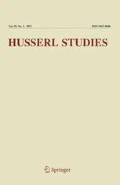Notes
Thomas M. Seebohm, History as a Science and the System of the Sciences. Phenomenological Investigations (Dordrecht: Springer, 2015), xvii + 443.
“But formalization is something essentially different from variation. It does not consist in imagining that the determinations of the variants are changed into others; rather, it is a disregarding, an emptying of all objective, material determinations” (Husserl 1973, 359).
See Formal and Transcendental Logic, where Husserl explicitly connects the constitution of “analytico-formal universalities” (Husserl 1969, 249) to “phantasy variation” (ibid.). See also (ibid., 306).
Because Seebohm’s entirely justified focus on history as an objective (positive) science nevertheless elides Husserl’s late phenomenological reflections on the historicity inseparable from the constitution of the foundational meanings of the exact sciences, the critical attention to Seebohm’s thought to follow will also have strong implications for the meaning of history, and Seebohm’s account of that meaning, in phenomenology in general and specifically for his project of a phenomenological epistemology. To wit: the extension of the Sinn of “history” beyond the causally determined history facts investigated by the positive science of history, to include the intentional-historical dimensions of the meanings that determine rather than are determined by Seebohm’s genetic account of the constitution of meaning in the life-world, will be sketched.
Seebohm’s engagement with Klein’s thought and its relation to Husserl relies on (Hopkins 2011).
(Nenon 2020) contains “a critical analysis and explication of the work of Thomas Seebohm” (ix), including the book here under review. However, none of the volume’s discussions of (Seebohm 2015) critically engage his view of history in light of Husserl’s late reflections on the intentional-historical constitution of the meaning of the exact sciences. In this connection, James Dodd’s “Mathesis and Lifeworld: Some Remarks on Thomas Seebohm’s History as a Science and the System of Sciences” (Nenon 2020, 97–111) argues that Seebohm’s genetic account of the origin of mathematical thinking and the abstract theoretical objects given in such thinking is “perfectly commensurable” (111) with “a depth investigation of the historical interweaving of mathesis and lifeworld” (ibid.). The remainder of my discussion takes issue with this kind of assessment of Seebohm’s thought on this matter, and thus represents a supplement to the critical analysis of Seebohm’s final work in (Nenon 2020).
For the past two years (2019–2020) I have had the good fortune to be a member of such a community at the Institute of Philosophy, Czech Academy of Sciences, Prague: Ladislav Kvasz (Institute of Philosophy, Czech Academy of Sciences, Dept. of Mathematics and Mathematics Education, Charles University), Matyáš Havrda (Institute of Philosophy, Czech Academy of Sciences), Štěpán Holub (Department of Algebra, Charles University), Ansten Klev (Post-Doc Researcher in Mathematics, Institute of Philosophy, Czech Academy of Sciences), Jan Makovský (Center for Theoretical Study, Czech Academy of Sciences), and Petr Kůrka (Center for Theoretical Study, Czech Academy of Sciences and Charles University).
References
Hopkins, B. (2011). The origin of the logic of symbolic mathematics. Edmund Husserl and Jacob Klein. Bloomington, IN: Indiana University Press.
Hopkins, B. (2017). Husserl and Jacob Klein. In S. Centrone (Ed.), Essays in Husserl’s logic and philosophy of Mathematics (pp. 461–484). Springer.
Husserl, E. (1969). Formal and Transcendental Logic. Translated by Dorion Cairns. The Hague: Martinus Nijhoff.
Husserl, E. (1970). The Crisis of European Philosophy and Transcendental Philosophy: An Introduction to Phenomenological Philosophy. Translated by David Carr. Evanston, IL: Northwestern University Press.
Husserl, E. (1973). Experience and Judgment. Translated by James S. Churchill and Karl Ameriks. Evanston, IL: Northwestern University Press.
Husserl, E. (1977). Phenomenological Psychology. Translated by John Scanlon. The Hague: Martinus Nijhoff.
Husserl, E. (2014). Ideas for a Pure Phenomenology and Phenomenological Philosophy. First book: General Introduction to Pure Phenomenology. Translated by Daniel O. Dahlstrom. Hackett Publishing Company: Indianapolis/Cambridge.
Klein, J. (1969). Greek Mathematical Thought and the Origin of Algebra. Translated by Eva Brann. Cambridge, MA: The M.I.T. Press. Originally published as “Die griechische Logistik und die Entstehung der Algebra” in Quellen und Studien zur Geschichte der Mathematik, Astronomie und Physik, Abteilung B: Studien, vol. 3, no. 1. Berlin (1934), 18–105 (Part I); no. 2 (1936), 122–235 (Part II).
Klein, J. (1985a) "The World of Physics and the ‘Natural’ World." In Lectures and Essays, edited by R. B. Williamson and E. Zuckerman, translated by David Lachterman, 65–84. Annapolis, MD: St John’s Press.
Klein, J. (1940) (1985b). "Phenomenology and the History of Science." In Philosophical Essays in Memory of Edmund Husserl, edited by M. Farber, 143–63. Cambridge, MA: Harvard University Press. Reprinted in Lectures and Essays, edited by R. B. Williamson and E. Zuckerman, 65–84. Annapolis, MD: St John’s Press.
Lohmar, D. (1989). Phänomenologie der Mathematik. Kluwer.
Nenon, T. (Ed.). (2020). Thomas Seebohm on the foundations of the sciences. An analysis and critical appraisal. Berlin: springer.
Seebohm, T. (2015). History as a Science and the System of the Sciences. Phenomenological Investigations. Dordrecht: Springer.
Wiegand, O. (2015). "Thomas Mulvany Seebohm (1934–2014)." The New Yearbook for Phenomenology and Phenomenological Philosophy, XIV: 377–378.
Author information
Authors and Affiliations
Corresponding author
Additional information
Publisher's Note
Springer Nature remains neutral with regard to jurisdictional claims in published maps and institutional affiliations.
Rights and permissions
About this article
Cite this article
Hopkins, B.C. Post-Husserl Husserlian Phenomenological Epistemology: Seebohm on History as a Science and the System of Sciences. Husserl Stud 38, 67–85 (2022). https://doi.org/10.1007/s10743-021-09291-0
Accepted:
Published:
Issue Date:
DOI: https://doi.org/10.1007/s10743-021-09291-0

